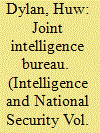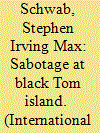|
|
|
Sort Order |
|
|
|
Items / Page
|
|
|
|
|
|
|
| Srl | Item |
| 1 |
ID:
188287


|
|
|
|
|
| Summary/Abstract |
The vast majority of intelligence history focuses on operations and executive decisionmaking rather than attending to, among other topics, analytical work or day-to-day organizational activities in the full (hierarchical) breadth of agencies. Especially in the studies on the Cold War period, one of the major implications of this research focus is that women, in so far as they are not part of top leadership or critical to operations, are excluded from analysis. This article argues that, during the Cold War period, security and intelligence services were constructed as a masculine profession. The article advances three professional standards that were constructed as masculine: a sense of responsibility, female support, and full-time availability. Empirically, this research focuses on the Dutch Security Service (in-depth interviews and archival research).
|
|
|
|
|
|
|
|
|
|
|
|
|
|
|
|
| 2 |
ID:
116166


|
|
|
|
|
| Publication |
2012.
|
| Summary/Abstract |
Secret intelligence became a major ingredient in international relations in the twentieth century, vital as much to peace as to war. Cooperation was an ingredient in intelligence success, with the British-American special relationship the century's prime and dominant example. The US-UK arrangement reached a Churchillian apogee in the 1940s and 1950s, then in the 1960s there were signs of change. Upheavals within American society, new challenges to US foreign policy, a decline in British capabilities and the end of the Cold War did not destroy the Anglo-American intelligence relationship, but they did undermine its exclusive character.
|
|
|
|
|
|
|
|
|
|
|
|
|
|
|
|
| 3 |
ID:
111187


|
|
|
| 4 |
ID:
111181


|
|
|
|
|
| Publication |
2012.
|
| Summary/Abstract |
In 1946 veteran British intelligence officer Kenneth Strong undertook the Directorship of a new intelligence organization, the Joint Intelligence Bureau (JIB). The JIB absorbed the responsibilities of several wartime intelligence organs, and was responsible for economic, topographic, and aspects of scientific intelligence on an inter-service basis. Its responsibilities grew over the following 18 years; most notably, it absorbed atomic intelligence in 1957. When the Defence Intelligence Staff was created in 1964, absorbing the JIB and the individual Service agencies, JIB was at its heart and Kenneth Strong its first Director. The organization conducted key work in the early Cold War, was at the centre of an international network of Joint Intelligence Bureaux, and was an important stepping stone in the movement to centralize military and military-relevant intelligence in Britain - but the historiography pays it surprisingly little attention. This paper introduces the JIB and various aspects of its work, and demonstrates that its low profile in the historiography is unjustified.
|
|
|
|
|
|
|
|
|
|
|
|
|
|
|
|
| 5 |
ID:
111624


|
|
|
| 6 |
ID:
127722


|
|
|
|
|
| Publication |
2014.
|
| Summary/Abstract |
International economic issues have become a foremost government concern since the start of the global financial crisis, leaving economic security increasingly linked to more traditional concepts of national interest and politico-military security. This prioritization has been reflected in the recent requirements of the United Kingdom's intelligence and security actors. Yet, scholarly research has neglected the relationship between intelligence, international economics, and contemporary security policy. Taking current requirements as a catalyst, this article draws on contemporary British history to explore when intelligence can be used to protect economic security and when intelligence actors can best use economic measures to achieve broader politico-military goals. The use of secret intelligence in the economic sphere does, however, have certain limitations and it should therefore only be employed when necessary
|
|
|
|
|
|
|
|
|
|
|
|
|
|
|
|
| 7 |
ID:
059622


|
|
|
|
|
| Publication |
London, William Heinemann Ltd., 1985.
|
| Description |
xviii, 619p.hbk
|
| Standard Number |
0434021105
|
|
|
|
|
|
|
|
|
|
|
|
Copies: C:1/I:0,R:0,Q:0
Circulation
| Accession# | Call# | Current Location | Status | Policy | Location |
| 031054 | 327.120941/AND 031054 | Main | On Shelf | General | |
|
|
|
|
| 8 |
ID:
167499


|
|
|
|
|
|
|
|